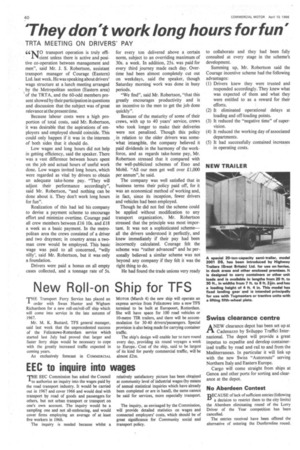They don't work long hours for fun'
Page 42

If you've noticed an error in this article please click here to report it so we can fix it.
TRTA MEETING ON DRIVERS' PAY
4,41cr 0 transport operation is truly effi cient unless there is active and positive co-operation between management and men", said Mr. J. S. Robertson, assistant transport manager of Courage (Eastern) Ltd. last week. He was speaking about drivers' wage structure at a lunch meeting arranged by the Metropolitan section (Eastern area) of the TRTA, and the 60-odd members present showed by their participation in questions and discussion that the subject was of great relevance at the present time.
Because labour casts were a high proportion of total costs, said Mr. Robertson, it was desirable that the aspirations of employers and employed should coincide. This could only happen if it was in the interests of both sides that it should do.
Low wages and long hours did not help in getting efficiency, said the speaker. There was a vast difference between hours spent on the job and actual hours of useful work done. Low wages invited long hours, which were regarded as vital by drivers to obtain an adequate take-home pay. "They will adjust their performance accordingly", said Mr. Robertson, "and nothing can be done about it. They don't work long hours for fun".
Realization of this had led his company to devise a payment scheme to encourage effort and minimize overtime. Courage paid all crew members between £16 10s. and £18 a week as a basic payment. In the metropolitan area the crews consisted of a driver and two draymen; in country areas a twoman crew would be employed. This basic wage was paid to all concerned, "willy nilly', said Mr. Robertson, but it was only a foundation.
Drivers were paid a bonus on all empty cases collected, and a tonnage rate of 5s. for every ton delivered above a certain norm, subject to an overriding maximum of 30s. a week. In addition, 25s. was paid for every third journey made each day. Overtime had been almost completely cut out on weekdays, said the speaker, though Saturday morning work was done in busy periods.
"We find", said Mr. Robertson, "that this greatly encourages productivity and is an incentive to the men to get the job done quickly".
Because of the maturity of some of their crews, with up to 40 years' service, crews who took longer to make their deliveries were not penalized. Though this policy in relation to the older drivers was somewhat intangible, the company believed it paid dividends in the harmony of the workforce, and as regards take-home pay, Mr. Robertson stressed that it compared with the well-publicized schemes of Esso and Mobil. "All our men get well over £1,000 per annum", he said.
The company was well satisfied that in business terms their policy paid off, for it was an economical method of working and, in fact, since its inception, fewer drivers and vehicles had been employed.
Though he did not feel the scheme could be applied without modification to any transport organization, Mr. Robertson stressed that the principle was most important. It was not a sophisticated scheme— all the drivers understood it perfectly, and knew immediately if their pay had been incorrectly calculated. Courage felt the scheme was "rather advanced" and he personally believed a similar scheme was not beyond any company if they felt it was the right thing to do.
He had found the trade unions very ready
to collaborate and they had been fully consulted at every stage in the scheme's development.
Summing up, Mr. Robertson said the Courage incentive scheme had the following advantages: (1) Drivers knew they were trusted and responded accordingly. They knew what was expected of them and what they were entitled to as a reward for their efforts.
(2) It eliminated operational delays at loading and off-loading points.
(3) It reduced the "negative time" of supervision.
(4) It reduced the working day of associated departments.
(5) It had successfully contained increases in operating costs.








































































































































